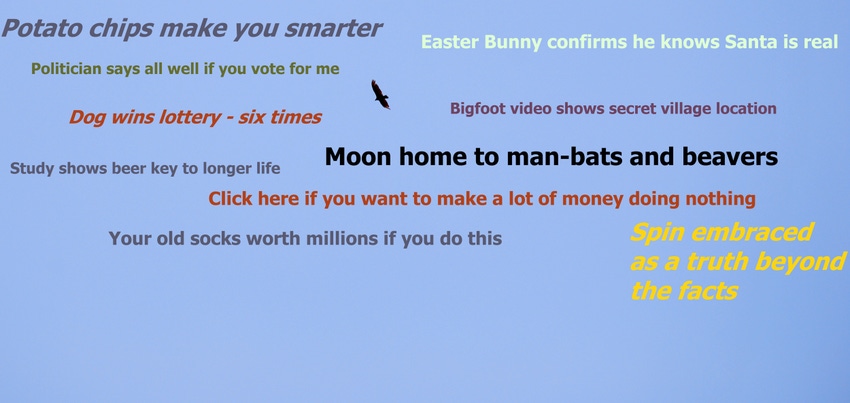
In 1835, The Sun published a series of stories about man-bats and other odd creatures confirmed to inhabit the moon, sourcing for the series a very real and legitimate scientist for the discovery. And folks ate it up.
The story was a lie, but one superbly guised to look like sober, church-clothes-wearing fact. A ploy by at least one person at The Sun who later admitted it was an attempt to boost circulation for the fledgling New York-based paper, the sham worked. The Sun enjoyed acceptance and circulation until 1950.
I believe the moon story began as no more than a joke, or a writer’s sardonic jab at society at the time. But people wanted to believe stories of man-bats (and even upright, tailless beavers roaming beachside property) on the moon. It caught the fascination of a populace beginning to look beyond its land borders and its mental borders, too. So, they believed. The story got legs and continued. It took several years before the tale was fully debunked.
As 2016 closes, the term ‘Fake News’ is in stories by many mainstream media outlets reporting on it and trying to figure out how in the world made-up stories became so accepted as fact by so many in the year’s politically charged rhetoric atmosphere, not just accepted by some but perpetuated by opportunistic political candidates on both sides. It was the latest, but certainly not the first, tussle between ‘real’ journalism and lies dressed up to like it.
I’m a news junkie, you could say. I like to read or listen to my news on radio. I get most of my news from internet-based sources with pretty good records of unbiased reporting. And if the sites are biased toward a particular subject or political regime, I try to understand which way it leans consistently, which, too, can be useful.
The internet now drives the most efficient mass broadcast of immediate information in the history of man, a powerful tool which does great good for individuals and societies across the planet. But the babble it creates is its double-edged slice. The internet also is an efficient way to propagate misinformation. Anyone can do it, too. People still want to believe.
With its endless ocean of information, the internet ironically allows individuals to precisely pluck out what kinds of information they want to consume or views they would rather believe; and that silo-like media consumption is maybe too often done to support a strong political view no matter the facts. Spin is too often embraced as a truth beyond the facts.
In our digital-screen world, legitimate reporting (or at least attempts at it) is now tangled up with fake news, misinformation and opinion-based spin in a way like never before. And that is a shame.
Take care, good luck and thanks for reading.
About the Author(s)
You May Also Like






